Wechua Spring: Difference between revisions
No edit summary |
|||
| Line 58: | Line 58: | ||
==The Soviet Offensive== | ==The Soviet Offensive== | ||
===The Grito de Parap=== | ===The Grito de Parap=== | ||
=== | ===Alexandrian Uprising=== | ||
==Constitutional Convention== | ==Constitutional Convention== | ||
Revision as of 21:23, 22 July 2018
| The Wechua Spring | |||||||
|---|---|---|---|---|---|---|---|
 The Grito of Apurimaq, the first demonstration in the Wechua Spring. |
|||||||
|
|||||||
| Belligerents | |||||||
| Communist Soviet of the Wechua Nation; Social Democrat Club; Kʼanchaq Ñan. | The Wechua Nation Supported by: Caputia (1662) |
||||||
| Commanders and leaders | |||||||
| Pacha Pinchi (CSWN); Awak Huanca Cocha (Social Democrat); Jaillita Pinto (KÑ). | HM Manco Cápac; Kayara Mayhuasca Soncco; General Phakchay Chaupin. |
||||||
The Wechua Spring, also referred to as the Wechua Revolution, is an ongoing armed conflict between the government of the Wechua Nation and the insurgent Kʼanchaq Ñan (Shining Path) guerilla group, which is the armed wing of the Communist Soviet of the Wechua Nation (known as the CSWN, or the Ceswan).
The Wechua Spring began as a wave of both violent and non-violent demonstrations, protests, and riots in 1662 AN in the cities of Apurimaq and Rimarima, organized by the Social Democrat Club and the Communist Soviet of the Wechua Nation. These protests gained lots of support due to dissatisfaction with the government of the Inkap Ratin Kayara Mayhuasca Soncco, steep increases in the prices of food and fuel, and high youth unemployment. Violent clashes between protestors and government forces in these cities triggered larger demonstrations in other cities like Parap, Auquimarca, and Huichajanca.
Background
State of the Wechua Economy
The Wechua Labor Movement
Wechua Political Realities
Grito de Apurimaq
Soviet Insurgency
Operation Custodian
Caputian Support to Wechua Government
The Soviet Offensive
The Grito de Parap
Alexandrian Uprising
Constitutional Convention
Period of National Reconciliation
Aftermath
See also
- The Wechua Nation, Forum.